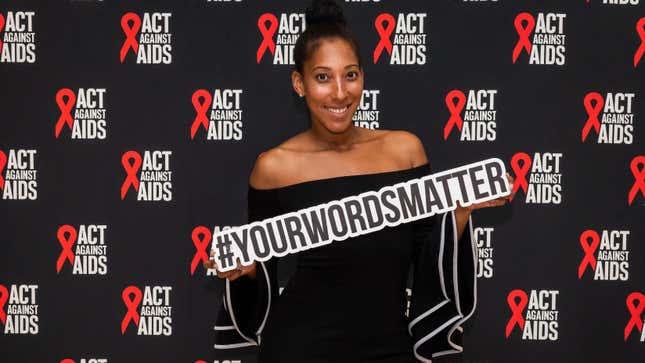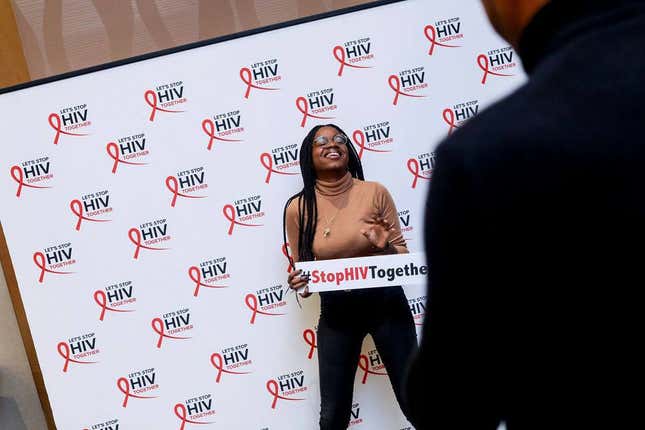
“I never thought this would happen to me,” she said, in between attempts to catch her breath and wipe away the tears that fell from her face. “HIV isn’t supposed to happen to me.” I will never forget how heavy her words felt as they landed in my ears. The woman was visiting an HIV/AIDS awareness and testing event hosted by the National Black Justice Coalition and Angela Yee of the Breakfast Club and Juices for Life; suddenly, she was sharing her story of becoming HIV- positive to encourage three high school-age girls to get tested.
This, after one of the girls emphatically stated, “I can’t get HIV, that’s a gay disease.”
It’s 2020, and the perception still persists that HIV/AIDS is a “gay” disease. But the reality is different: Nearly a quarter of new HIV infections are women, and about 59 percent of those infected are straight black women. That means black women are at higher risk for acquiring HIV than any other demographic of women—and that’s even before accounting for black trans women, who are at high risk of infection but aren’t included in those numbers.
This past Tuesday was National Women and Girls HIV/AIDS Awareness Day (NWGHAAD). With black women most affected by the virus, it’s time to finally name the problem so we can start to solve it.
Sadly, it’s not actually all that surprising that black women are hit hardest by HIV/AIDS infection rates, because this disparity is part of a grim pattern: Black women are given short shrift in America’s healthcare system overall, and this affects access to HIV/AIDS prevention and treatment.
Black women are three to four times more likely to die in childbirth than white women are, and they’re 40 percent more likely to die from breast cancer, even though they’re less likely to get it. And black people are less likely than white people to get sufficient pain relief. Black Americans are also disproportionately more likely to have poor or no health coverage than white Americans are.
With the odds so stacked against black women receiving compassionate, competent care—or any care at all—is it any wonder they disproportionately slip through the cracks in terms of being tested and treated for HIV? One in seven black Americans and one in nine women living with HIV don’t even know that they have it.
The solutions are obvious: We need widespread healthcare reform that addresses race-based access and quality care disparities so black women can go to the doctor knowing they’ll be heard and seen. That’s going to take a while. In the interim, we need to increase low- and no-cost access to HIV and STI testing, as well as access to PrEP prescriptions and education about taking it (it’s an easy daily pill, like birth control, and minimizes a woman’s chance of contracting HIV by 90 percent%).

The National Black Justice Coalition, which I lead, keeps a tool on its homepage to help people find free HIV-related resources in their own communities. We’ve also developed a Words Matter HIV toolkit to provide language and resources to decrease stigma and increase awareness, but we need more of everything. We also need to prioritize having conversations as a community to raise awareness of black women’s disproportionate risk of contracting HIV—and ways to both prevent and treat it.
Beyond healthcare access, there are other reasons that women in general, and Black women in particular, remain uniquely susceptible to HIV.
According to the Office on Women’s Health, part of the U.S. Department of Health and Human Services, having another sexually-transmitted disease raises a woman’s risk of HIV infection more than a man’s. Additionally, women are more likely to lack control in relationships and can experience violence or stigma when they attempt to prevent HIV exposure. Black or multiracial women are more likely than white women to experience intimate partner violence, which again puts them at higher risk. Keeping up a drumbeat of awareness while pushing for larger societal change is the best option here, too.
So no, HIV and AIDS are not ‘a gay disease,’ as the young sister at our event was taught to believe. HIV and AIDS are diseases that, like most, impact the most marginalized. To fight this disease we need more than just high-tech labs and research funding; we also need a broad band of support and solidarity to uplift all Black people in our fight for equitable healthcare, civil rights, education, and safety, so we can all get free. This work starts with accepting that HIV is not a gay disease. Sisters, can you hear me?

